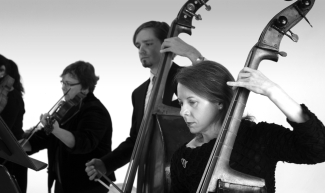Event
Vivaldi: Juditha Triumphans
Performance by Tempesta di Mare with Penn Colloquium Musicum and Soloists Meg Bragle (Artist in Residence), Kirsten Sollek, Rebecca Myers, and Gabriela Estephanie Solís
Tempesta di Mare
March 16, 2024 (Saturday) – 4:00 PM to 6:30 PM
Main Hall
Irvine Auditorium
3401 Spruce St
Philadelphia, PA 19104
Purchase Tickets Here (LINK) (Free for students with ID)
Soloists:
Juditha, a young Bethulian widow: Meg Bragle
Holoferes, Assyrian general: Kirsten Sollek
Vagaus, a eunuch, Holofernes's squire: Rebecca Myers
Abra, Juditha's handmaid: Gabriela Estephanie Solís
Tempesta di Mare | Philadelphia Baroque Orchestra
Gwyn Roberts & Richard Stone, directors | Emlyn Ngai, concertmaster
Choir: Penn Collegium Musicum | Meg Bragle, director
The Plot:
The Assyrian king Nebuchadnezzar sends an army against Israel to demand overdue tributes. Under the leadership of the general Holofernes, the Assyrians lay siege to the town of Bethulia and are about to conquer it. The young Jewish widow Judith goes to him to implore mercy. He falls in love with her and she indulges him. After a rich banquet and having drunk much wine, Holofernes falls asleep. Judith beheads him, flees the enemy camp, and returns victorious to Bethulia.
Background and Origin:
Vivaldi composed Juditha Triumphans in 1716 for the all-female musical ensemble and singers of the Ospedale della Pietà in Venice, where it was premiered. All roles, including those of male characters and the 4-part choruses, were performed by the women who lived at the Pietà, and who were renouned across Europe for their exceptional virtuosity and skill.
In addition to the normal orchestral instruments—strings, oboes and continui—Vivaldi scored Juditha for a colorful multitude of other instruments available to him at the Pietà: chalumeau, clarinet, trumpet, timpani, viola d-amore, recorder, theorbo, mandoline and a consort of viols.
ABOUT TEMPESTA DI MARE
This project is part of A Fuller Story, Tempesta’s ongoing exploration of diversity and inclusion in baroque music. You can read more about the female musicians of the Venetian Ospedali Grandi here.
Tempesta di Mare is named after a concerto by Antonio Vivaldi. Translated to mean “storm at sea,” Tempesta di Mare reflects the composers’ view of instrumental music as a vivid, rhetorical craft, capable of conveying emotional drama to its listeners. The orchestra performs self-led—no conductor—just as they did when the music was new.
Led by directors Gwyn Roberts and Richard Stone, with concertmaster Emlyn Ngai, Tempesta defines itself by this rhetorical approach to baroque music through concerts, recordings and broadcasts
